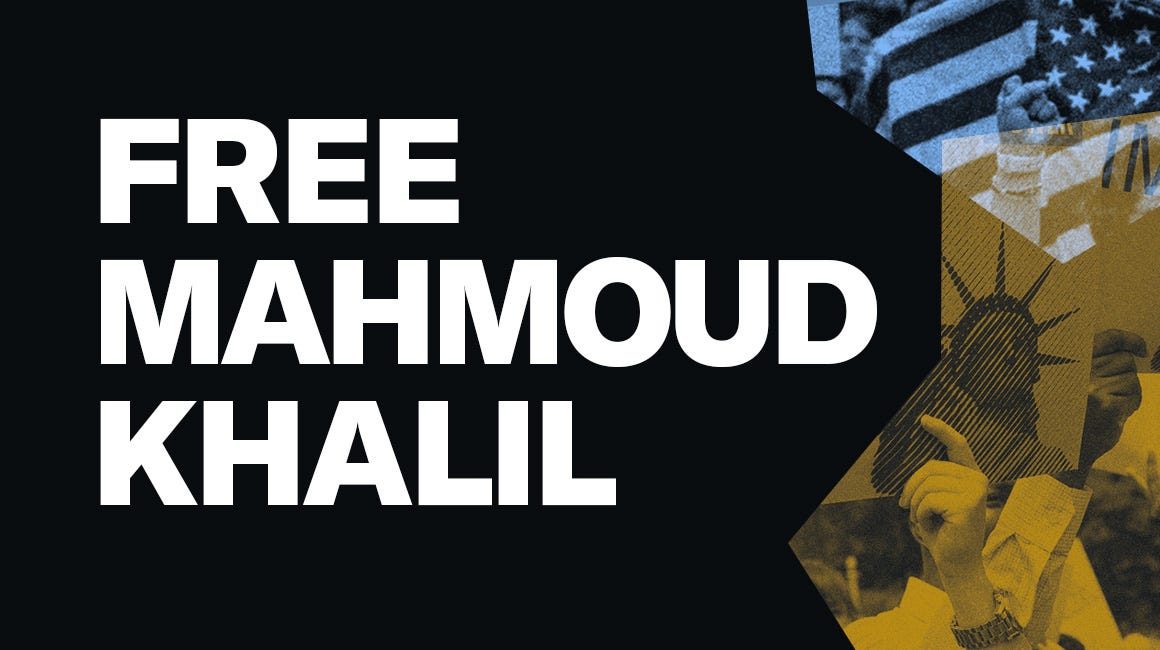In the Shadow of Genocide: A Pregnant Wife's Fight for Justice
Generational trauma and the inheritance of grief
I cannot stop thinking about Palestinian activist Mahmoud Khalil who was at the forefront of the pro-Palestinian protests at Columbia University and even more, his wife.
Imagine being eight months pregnant, walking back from iftar in the holy month of Ramadan by your husband's side. You're dreaming of what life will be like in just a few short months when your baby arrives. Then suddenly, government agents appear, arresting your husband and threatening to arrest you too if you interfere. For days afterward, you don't know where your husband is being detained.
This is reality of Khalil’s wife, who has pled for her husband's release in time for the birth of their baby following his arrest by federal immigration officers over the weekend.
"I urge you to see Mahmoud through my eyes as a loving husband and the future father to our baby," she told Newsweek in a statement issued through her husband's attorney, Amy E. Greer. "I need your help to bring Mahmoud home, so he is here beside me, holding my hand in the delivery room as we welcome our first child into this world."
Khalil's wife, the child of Syrian refugees is carrying not just their child but the weight of life itself. Now, in the middle of Ramadan—when Israel has launched offensives against Palestinians year after year—she's living a nightmare. The fear, the grief, the injustice. It all mirrors. Over and over again.
To inherit memory is to carry the past in your body, even when the world demands you forget.
For Palestinians, generational trauma isn't just something passed down—it's lived daily. It's a mother in Gaza cradling her newborn in the dark, wondering if the sky will fall before morning. It's a grandfather clutching the key to a home that no longer exists. It's the echoes of past massacres, present-day sieges, and the Nakba stretching endlessly forward.
And it's not just Palestinians. Armenians, Indigenous peoples across the Americas, descendants of enslaved Africans—we all know this weight. This grief never settles because history never stops repeating itself. The systems that enabled our ancestors' destruction remain in power, still deciding whose lives matter and whose deaths are just collateral.
I think about my own country, Bangladesh, and the genocide of 1971. When the Pakistani military waged a brutal crackdown against Bengali civilians—killing up to three million people and raping hundreds of thousands of women—the U.S. didn't just turn away. It actively supported Pakistan's military dictatorship. Nixon and Kissinger, obsessed with maintaining their Cold War alliances, ignored reports of mass slaughter, even as their own diplomats in Dhaka begged them to act. The U.S. continued sending military aid, shielding Pakistan from accountability, ensuring Bangladesh's suffering remained an afterthought on the world stage. It's a story I carry, like so many others whose histories are buried under Western silence.
The U.S. is no bystander in any of this. Its fingerprints are all over Palestine's suffering, just as they've been all over genocides worldwide. In Indonesia (1965-66), U.S. intelligence backed the military as it massacred up to a million suspected communists. In East Timor (1975-1999), Washington armed and shielded Indonesia's brutal occupation. In Guatemala (1980s), the U.S. funded and trained the military as it wiped out Indigenous Mayan communities. Rwanda. The Congo. Yemen. The pattern repeats: the U.S. props up mass killings, funds war machines, and rewrites history to frame itself as the hero.
And here, in this supposed land of free speech, the price of truth keeps rising. The Ivy League institutions that built their wealth on slavery, colonization, and war now punish students and faculty for speaking out against genocide. Jobs rescinded. Degrees withheld. Academics blacklisted. Meanwhile, billionaires and political elites—whose fortunes were made off the backs of the Global South—decide who gets to speak, who gets to exist, and who is erased.
The trauma continues. It does not end with the survivors—it is passed down, embedded into the body, inherited before birth. Khalil's future child is already carrying this weight, already absorbing their mother's fear, already shaped by war before taking their first breath. Imagine bringing life into a world that does not see it as worthy of protection. Imagine a child's first inheritance being grief.
“I was born and raised in the Midwest. My parents came here from Syria, carrying their stories of the oppressive regime there that made life unlivable. They believed living in the US would bring a sense of safety and stability. But here I am, 40 years after my parents immigrated here, and just weeks before I'm due to give birth to our first child, and I feel more unsafe and unstable than I have in my entire life,” said Khalil’s wife in her statement.
This is what we mean when we say it all mirrors. Over and over again.



infuriating. just donated.
I've been at a loss for words, but you just captured them perfectly.